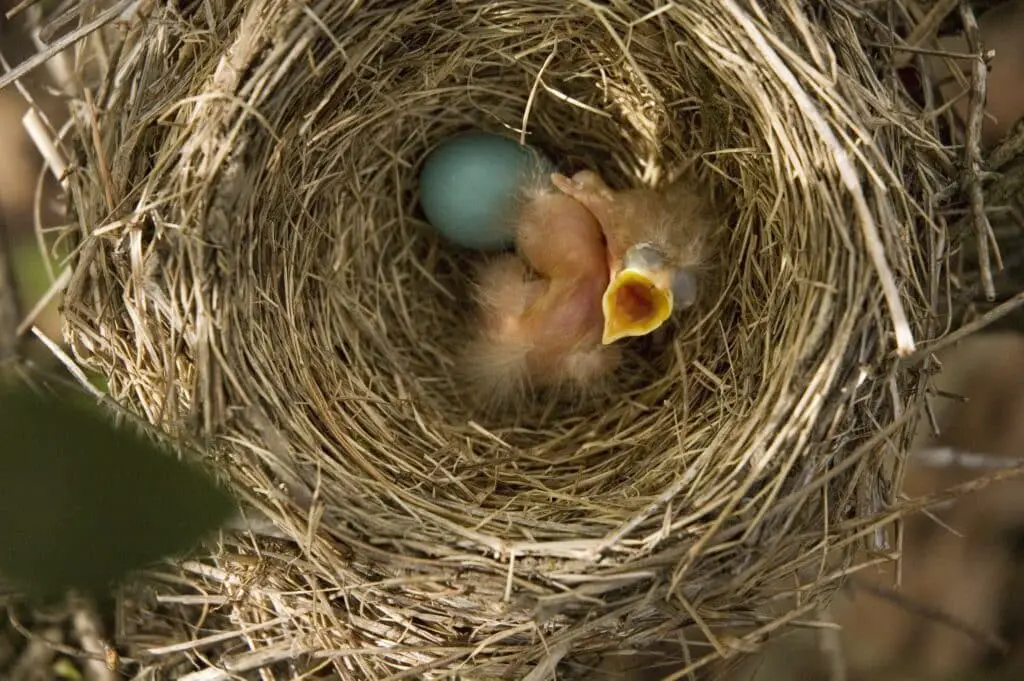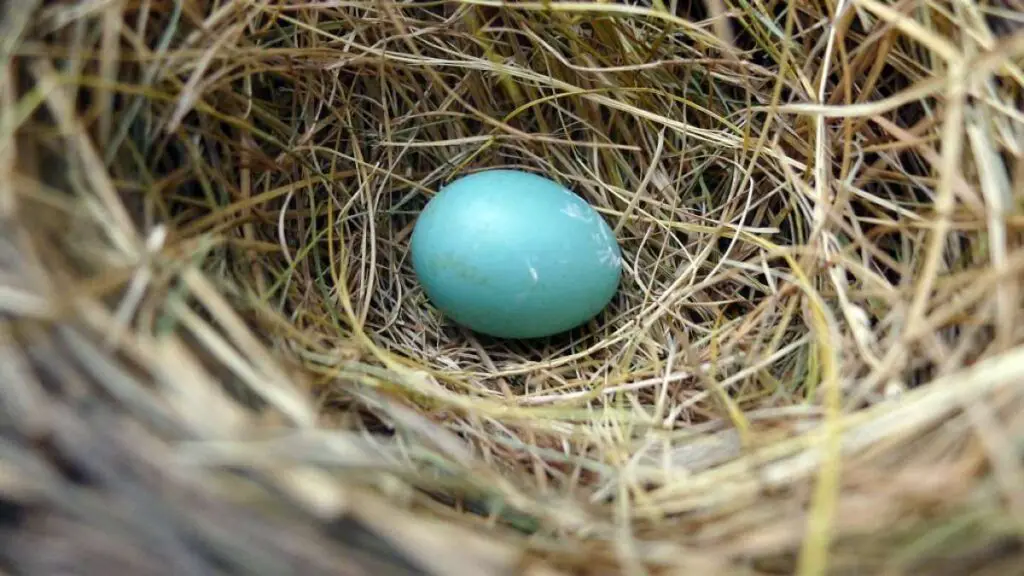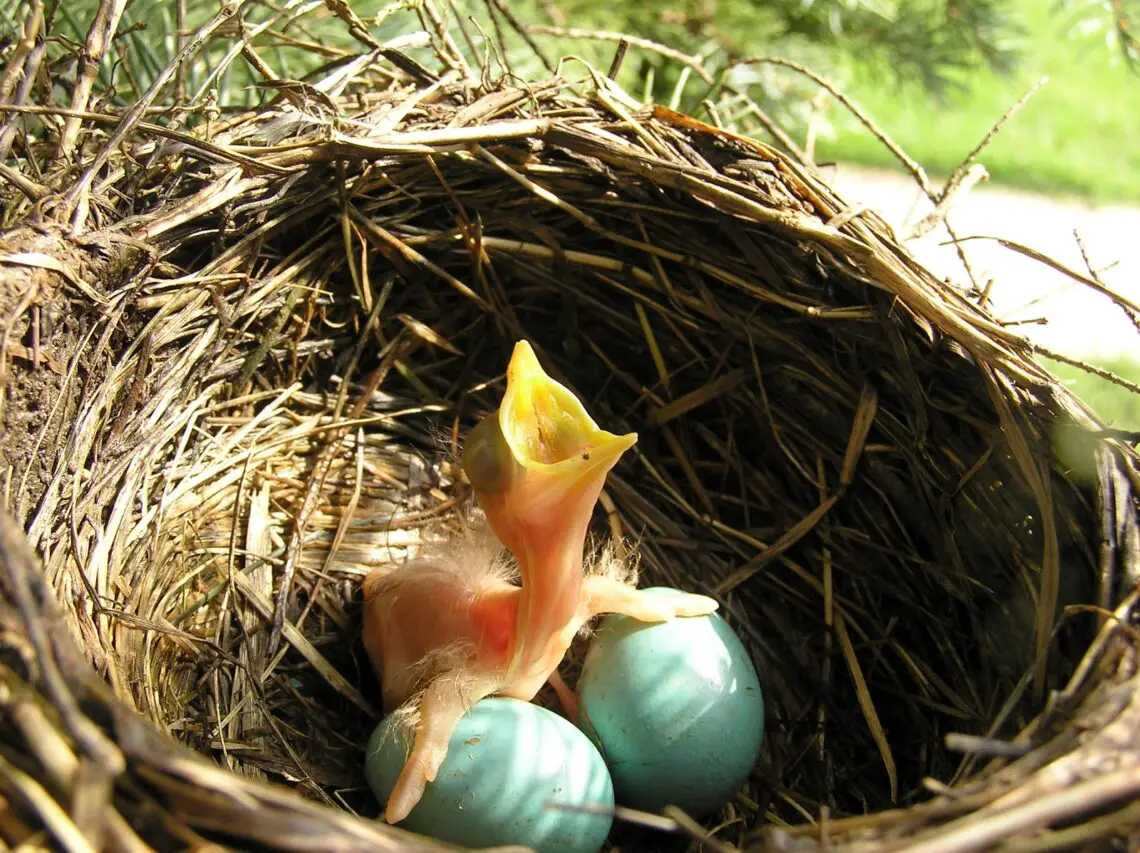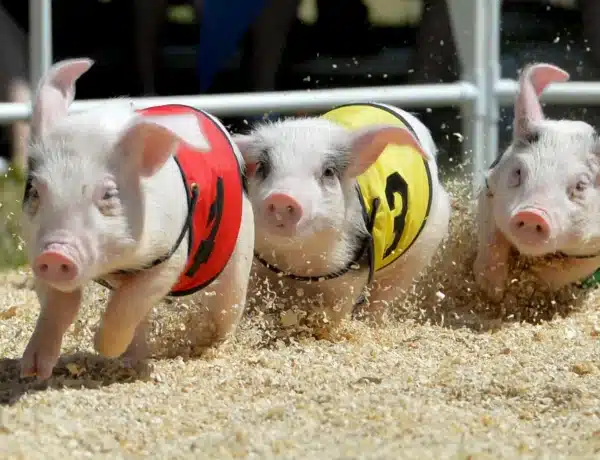Introduction
Why Are Robin Eggs Blue: The remarkable blue color of robin eggs represents a captivating aspect of avian biology. Understanding the science behind this vivid hue takes us on a journey into the intriguing adaptations that birds have evolved for reproduction and nest protection. While the aesthetics of robin eggs may be pleasing to the human eye, they play a pivotal role in the survival and success of the robin species.
The unique blue pigment found in these eggs is a result of a complex interplay between genetics, physiology, and environmental factors. It serves multiple functions, such as camouflaging the eggs from predators, regulating temperature within the nest, and possibly even signaling the health and quality of the mother robin to potential mates.
The coloration of robin eggs can vary from pale blue to deep turquoise, raising questions about the factors that influence these variations. Researchers continue to investigate the precise mechanisms behind the formation of blue pigments in bird eggs, shedding light on the mysteries of nature’s palette.

Are Robin eggs the only blue eggs?
Robin’s eggs aren’t the only blue wild bird eggs. Many other species, including some chickens, also lay eggs in various shades of blue, teal, turquoise, and blue-green, including: Araucanas, ameraucanas, Easter egger, legbar, and copper maran chicken breeds. Black tinamous.
Eastern Bluebird: Eastern Bluebirds, found in North America, lay pale blue eggs. These eggs are similar in color to robin eggs but are slightly smaller.
American Bluebird: American Bluebirds, closely related to Eastern Bluebirds, also lay pale blue eggs.
Starling: European Starlings, invasive in North America, produce pale blue eggs speckled with tiny dots.
Blackbird: Blackbirds, often found in Europe, lay pale blue or greenish-blue eggs.
Song Sparrow: Song Sparrows, common throughout North America, can produce eggs ranging from blue to greenish-blue.
Why Are Eggs Blue: The blue coloration of these eggs is primarily due to the pigment biliverdin, which is a byproduct of hemoglobin breakdown in the bird’s liver. The concentration of biliverdin and other factors like the thickness of the eggshell determine the precise shade of blue.
Are Robin’s eggs always blue?
Robin’s eggs aren’t even blue. They are blue-green, and as “blue” as the Statue of Liberty. The pigment offers UV protection with minimal overheating. Scientists are testing the hypothesis that blue eggshells (unlike dark colors) both shield the interior from UV radiation and prevent the egg from heating up.
Natural Variation
While robin’s eggs are typically associated with a bright blue color, there can be variations in their shade. Factors like the diet and health of the mother robin can influence the intensity of the blue pigment in the eggs. In some cases, the eggs may appear paler or even have a slight greenish tint.
Environmental and Genetic Factors
Environmental conditions and genetics also play a role. For instance, eggs laid later in the breeding season might be paler due to the mother’s nutrient stores being depleted. Additionally, different robin populations may exhibit subtle variations in egg color.
Camouflage and Predation
The blue color of robin’s eggs has evolved as a form of camouflage, helping to conceal them from predators. However, in some regions or environments, such as urban areas with non-native predators, the eggs may be at a higher risk of predation. This can lead to adaptations where robin eggs may have varying colors to better blend with their surroundings.
Can we eat Robin eggs?
So, all bird eggs are edible (except perhaps those of the wild Pitoui and Ifrita.) They are edible at any stage of development, and in some cultures incubated duck eggs are a delicacy called balut.
Legality and Protection
In many regions, robins are protected by laws and regulations that prohibit the removal or consumption of their eggs, as well as harming the birds themselves. These laws are in place to conserve native bird populations.
Ethical Considerations
Even where it may be legal, consuming robin eggs raises ethical concerns. Collecting eggs from wild birds can disrupt their breeding and nesting patterns, potentially harming the population. Ethical foraging practices emphasize minimizing human impact on wildlife.
Health and Safety
From a health perspective, robin eggs are generally not considered suitable for consumption. Wild bird eggs can carry pathogens, parasites, and contaminants that may pose health risks if consumed raw or undercooked.
Conservation Efforts
Robins, like many bird species, face various threats, including habitat loss and climate change. Conservation efforts aim to protect their populations. Consuming their eggs can counteract these conservation endeavors and harm the birds’ long-term survival.
Can humans hatch Robin eggs?
Robin eggs require high humidity, gentle daily turning, and level heat. You’d need a high-quality incubator to do it properly. Then once the babies hatch, parent robins feed them regurgitated worms and insects for the first three or four days—something humans just can’t do!.
Avian Incubation Expertise
Robins and other birds possess specialized skills for incubating their eggs. They can maintain a consistent temperature and humidity level, as well as turn the eggs regularly to ensure even development. Humans lack the physiological adaptations and instincts needed for successful avian incubation.
Eggshell Permeability
Bird eggs have semi-permeable shells that allow oxygen exchange and moisture regulation. Attempting to hatch robin eggs without the proper equipment and conditions would likely result in eggshell damage, causing harm to the developing embryo.
Ethical and Legal Concerns
Attempting to hatch robin eggs or any wild bird eggs is often illegal and ethically problematic. In many regions, interfering with the nests or eggs of wild birds is against the law and can lead to negative consequences for bird populations.
Conservation and Welfare
It is essential to prioritize the conservation and well-being of bird species. Human interference with robin eggs can disrupt natural breeding processes and harm bird populations, particularly in species facing conservation challenges.
Are robin eggs lucky?
Robins can be good luck charms. Many see the bright blue color of their eggs as a cheerful reminder that spring is coming, and thus, good times are ahead.
Symbolism of Blue
The vibrant blue color of robin eggs is often associated with the sky and the heavens. In many cultures, blue symbolizes peace, tranquility, and spiritual significance. This symbolism contributes to the perception of robin eggs as lucky.
Renewal and Rebirth
Robin eggs are a symbol of spring, representing the renewal and rebirth of life as robins often lay their eggs during this season. This association with new beginnings and growth adds to their fortunate connotation.
Protection and Nesting
Robins are known for their diligent nest-building and protective nature. This has led to the belief that robin eggs bring protection and security to those who possess them.
Natural Beauty and Rarity
The exquisite blue hue of robin eggs is admired for its natural beauty. Rare and captivating, these eggs are often seen as a fortunate find in nature.
Personal Beliefs
Ultimately, whether robin eggs are considered lucky is a matter of personal belief and cultural interpretation. Many people collect robin eggs or display them for their aesthetic and symbolic value.
Who sits on Robin eggs?
Once the clutch is complete, incubation is by the female alone for 13 days. The shells of the hatched eggs are removed immediately from the nest by the female, who sometimes eats part of them for extra calcium. The chicks hatch naked, and are totally dependent on their parents for food and warmth.
The Mother Robin
The responsibility of incubating robin eggs primarily rests with the female robin, which is the one that laid the eggs. After laying her eggs, the mother robin sits on them to keep them warm and protect them from potential threats.
Incubation Period
The incubation period for robin eggs typically lasts around 12 to 14 days, during which the mother robin diligently maintains the optimal temperature for embryo development. She uses her body heat to warm the eggs and ensure a consistent temperature.
Turn and Care
Throughout the incubation period, the mother robin also turns the eggs regularly. This turning helps prevent the embryo from sticking to the inner membrane of the eggshell, ensuring proper development.
Male Involvement
While the female robin is primarily responsible for incubation, the male robin may occasionally take short shifts to allow the female to feed and rest. This brief relief is crucial for the mother’s well-being during this demanding period.
Can robins have twins in one egg?
So twins are possible but unlikely in the world of wild birds. Those grocery store eggs with two yolks are genuine rarities.
Monotreme vs. Aves
Robins belong to the class Aves, which includes birds. Unlike monotremes, such as platypuses, birds do not reproduce by laying eggs that contain multiple embryos. Each bird egg is generally fertilized by a single sperm cell, resulting in a single embryo within the egg.
Zygote Development
In robins, as in most birds, the zygote (fertilized egg) develops into a single embryo. The embryo grows inside the egg, and as it develops, it absorbs the nutrients provided by the egg yolk.
Incubation and Hatching
During incubation, the mother robin keeps the eggs warm, allowing the single embryo to develop until it’s ready to hatch. After hatching, the mother cares for the chick, feeding it and ensuring its survival.
Why don’t all Robin eggs hatch?
Eggs can fail to hatch for a variety of reasons: infertility, environmental conditions like weather or chemical use, or physical damage to the eggshell.
Fertilization and Viability
Not all robin eggs are fertilized. Some may contain unfertilized eggs, which cannot develop into embryos. Additionally, even fertilized eggs can have genetic abnormalities that prevent proper development.
Environmental Conditions
The conditions in which the eggs are incubated play a crucial role. Extreme temperatures, humidity levels, or fluctuations in these factors can negatively impact embryo development. Inconsistent incubation by the mother robin can also lead to poor hatching success.
Predation and Parasites
Robins’ nests are vulnerable to predators, such as squirrels, snakes, and other birds, which can disturb or destroy eggs. Parasites like mites can infest robin nests, causing harm to both eggs and chicks.
Resource Availability
The mother robin needs to provide sufficient warmth and nourishment to her eggs during incubation. Inadequate food supply or environmental stressors can lead to malnourished or underdeveloped embryos.
Intraspecific Competition
In cases where multiple eggs are laid in a nest, there may be competition among embryos for resources. This intra-egg competition can result in the strongest chick hatching while others do not survive.
Why did one robin egg not hatch?
This may be an egg that wasn’t fertilized, or didn’t develop properly. After the other babies are a day or two old, the parents get rid of unhatched eggs just in case one of the growing babies accidentally crushes it. Rotten eggs are NO fun! There is also a chance that there really was a healthy baby inside the egg.
Unfertilized Egg
One of the most straightforward explanations is that the egg was not fertilized. If the female robin didn’t mate with a male or if the egg didn’t get fertilized for some reason, it cannot develop into a chick.
Genetic Abnormalities
Sometimes, genetic abnormalities can prevent an embryo from developing properly. These abnormalities may not be visible from the outside, but they can impair the embryo’s ability to survive.
Environmental Stressors
Incubation conditions are crucial for egg development. Fluctuations in temperature or humidity, disturbances in the nest, or prolonged exposure to adverse weather conditions can disrupt the development of an embryo.
Resource Competition
In nests with multiple eggs, there may be competition among the embryos for resources like warmth and nutrients. This intra-egg competition can lead to the strongest embryo hatching while others do not survive.
Predation and Parasites
Predators, such as snakes or other birds, may disturb the nest and damage the eggs. Parasites like mites can also infest the nest and harm the eggs.

Conclusion
The captivating blue coloration of robin eggs is a remarkable example of nature’s ingenuity and adaptation. While it may seem like a purely aesthetic feature, it serves a multitude of essential functions in the life of these birds. The unique blue pigment in robin birds eggs acts as a form of camouflage, helping to conceal them from potential predators while nestled in their nests. It also aids in regulating the temperature within the eggs, contributing to the successful development of the embryos.
Moreover, the blue hue of robin eggs may even play a role in mate selection, as it could signal the health and vitality of the mother robin. This intersection of color and biology highlights the intricate connections between appearance and function in the natural world.
The study of why robin eggs are blue not only deepens our understanding of avian biology but also underscores the intricate ways in which organisms adapt to their environments and communicate with their surroundings. It serves as a reminder of the beauty and complexity found in even the smallest aspects of the natural world, where aesthetics and functionality are seamlessly intertwined, contributing to the survival and perpetuation of life.





No Comments